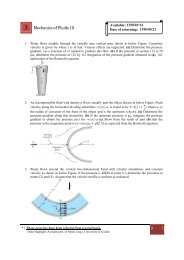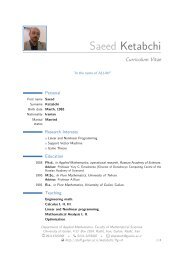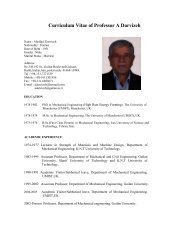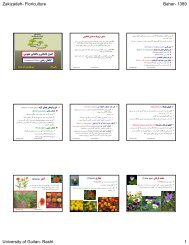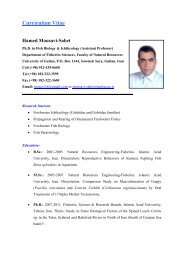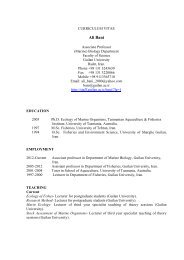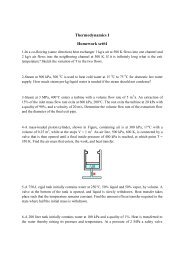Notes ● 18940. Cetron et al., Hospitality 2010, p. 37.41. Warner, “Globalization of <strong>Medical</strong> Care,” p. 74.42. A 2006 study by Exponent, a Philadelphia technology research firm, found thatas a result of an ag<strong>in</strong>g active population, artificial knee implants are expectedto <strong>in</strong>crease 673% by 2030 and hip replacements will <strong>in</strong>crease 174% dur<strong>in</strong>g thesame period. Daniel Coyle, “What He’s Been Pedal<strong>in</strong>g: How Floyd Landis HasManaged to Compete <strong>in</strong> the Tour de France Despite a Busted Hip,” New YorkTimes Magaz<strong>in</strong>e, July 16, 2006, p. 34.43. Henderson, “Healthcare <strong>Tourism</strong>,” p. 113.44. Ross, “Health <strong>Tourism</strong>: An Overview.”45. Warner, “Globalization of <strong>Medical</strong> Care,” p. 75.46. Prestowitz, Three Billion New Capitalists, p. 98.47. Mike Rob<strong>in</strong>son and Mar<strong>in</strong>a Novelli, “Niche <strong>Tourism</strong>: An Introduction,” <strong>in</strong> Niche<strong>Tourism</strong>, ed. Mar<strong>in</strong>a Novelli (Oxford: Elsevier Butterworth-He<strong>in</strong>emann, 2004).48. Stephen Clift and Stephen J. Page, eds., Health and the International Tourist(London: Routledge, 1996).49. David Hancock, The Complete <strong>Medical</strong> Tourist (London: John Blake, 2006); JeffSchult, Beauty From Afar: A <strong>Medical</strong> Tourist’s Guide to Affordable and QualityCosmetic Care Outside the U.S. (New York: Stewart, Tabori, and Chang, 2006);Josef Woodman, Patients Without Borders: The Smart Traveler’s Guide to Gett<strong>in</strong>gHigh-Quality, Affordable Healthcare Abroad, (Chapel Hill, NC: Healthy TravelMedia, 2007). The memoir is Maggi Grace and Howard Staab’s, State of theHeart: A <strong>Medical</strong> Tourist’s True Story of Lifesav<strong>in</strong>g Surgery <strong>in</strong> India (Oakland, CA:New Harb<strong>in</strong>ger Publications, 2007).50. CII-McK<strong>in</strong>sey, Healthcare <strong>in</strong> India: The Road Ahead (New Delhi: Confederationof Indian Industries, 2002).51. US Department of Commerce, Results of the Services 2000: A Conference andDialogue on Global Policy Developments and US Bus<strong>in</strong>ess (Wash<strong>in</strong>gton, D.C.,1998), cited <strong>in</strong> Ellen Wasserman, “Trade <strong>in</strong> Health Services <strong>in</strong> the Region ofthe Americas,” <strong>in</strong> WHO, Trade <strong>in</strong> Health Services, p. 137.52. Wasserman, “Trade <strong>in</strong> Health Services <strong>in</strong> the Region of the Americas,” p. 125.53. D. Frechtl<strong>in</strong>g, “Health and <strong>Tourism</strong> Partners <strong>in</strong> Market Development,” Journalof Travel Research 32, no. 1 (1993): pp. 52–63, cited <strong>in</strong> Henderson, “Healthcare<strong>Tourism</strong> <strong>in</strong> Southeast Asia,” p. 112.54. Chanda, “Trade <strong>in</strong> Health Services,” (CMH), p. 12.55. World Travel and <strong>Tourism</strong> Council, Country League Tables, the 2004 Travel and<strong>Tourism</strong> Economic Research, (Madrid: Travel and <strong>Tourism</strong> Economic Research,2004), Table 46.56. This is based on growth of aggregate GDP dur<strong>in</strong>g 1980–1992. World Bank, WorldDevelopment Report 1994 (Wash<strong>in</strong>gton, D.C.: World Bank, 1994), Table 2.57. New York Times, October 1, 2004.58. Ted Fishman, “The Ch<strong>in</strong>ese Century,” New York Times Magaz<strong>in</strong>e, July 4, 2004.59. Gustaaf Wolvaardt, “Opportunities and Challenges for Develop<strong>in</strong>g <strong>Countries</strong> <strong>in</strong>the Health Sector,” <strong>in</strong> UNCTAD-WHO Jo<strong>in</strong>t Publication, International Trade<strong>in</strong> Health Services, p. 63.
190 ● Notes60. Emerg<strong>in</strong>g markets <strong>in</strong>clude former Soviet Union or Soviet bloc countries as wellas develop<strong>in</strong>g countries that are undergo<strong>in</strong>g rapid rates of economic growth. Ofthe emerg<strong>in</strong>g markets recently featured <strong>in</strong> a Harvard Bus<strong>in</strong>ess Review study,Argent<strong>in</strong>a, Chile, India, and South Africa are <strong>in</strong>cluded <strong>in</strong> this book (TarunKhanna and Krishna Palepu “Emerg<strong>in</strong>g Giants” Harvard Bus<strong>in</strong>ess Review,October 2006, p. 62). The BRIC group of countries, considered the new economicpowerhouses, consist of Brazil, Russia, India and Ch<strong>in</strong>a. India is part ofthis study.61. Chanda expla<strong>in</strong>s this fact by the presence of external and <strong>in</strong>ternal barriers(Chanda, “Trade <strong>in</strong> Health Services,” (CMH), p. 40).62. Dubai Healthcare City, “About DHCC,” www.dhcc.ae, accessed June 15, 2006.63. Friedman, The World is Flat ; and Prestowitz, Three Billion New Capitalists.64. Paul Kennedy, The Rise and Fall of the Great Powers (New York: Random House,1987).65. Economist, January 21, 2006, pp. 69–70.66. These chang<strong>in</strong>g demarcations require a change <strong>in</strong> term<strong>in</strong>ology. We can nolonger use the term “third world” because, with the end of the Cold War, thefirst and second worlds no longer exist and with their disappearance, the conceptof a third world has become mean<strong>in</strong>gless. Perhaps the World Bank term,“emerg<strong>in</strong>g economies,” might be appropriate, given the growth rates of manydevelop<strong>in</strong>g countries, especially those under study. However, that term <strong>in</strong>cludesthe countries of the former Soviet bloc and Soviet Union, all with hugely differentlegacies and potentials. The term<strong>in</strong>ology issue rema<strong>in</strong>s unresolved asscholars cont<strong>in</strong>ue to refer to develop<strong>in</strong>g countries by a variety of names.67. Milica Z. Bookman, Tourists, Migrants and Refugees: Population Movements <strong>in</strong>Third World Development (Boulder, CO: Lynne Rienner, 2006), chap. 1.68. Donald Lundberg, M<strong>in</strong>k Stavenga, and M. Krishnamoorthy, <strong>Tourism</strong> Economics(New York: Wiley, 1995), p. 8.Chapter 21. Mike Rob<strong>in</strong>son, foreword <strong>in</strong> Niche <strong>Tourism</strong>, ed. Mar<strong>in</strong>a Novelli (Oxford:Elsevier Butterworth-He<strong>in</strong>emann, 2004), p. xix. The transformative power oftourism, discussed <strong>in</strong> the literature, is amplified <strong>in</strong> medical tourism becausetransformation takes place both at the level of the imag<strong>in</strong>ation as well asthe body.2. World Bank Group, “World Bank Revisits Role of <strong>Tourism</strong> <strong>in</strong> Development,”Trade Research 17, no. 12, (1998).3. Cited <strong>in</strong> Deborah McLaren, Reth<strong>in</strong>k<strong>in</strong>g <strong>Tourism</strong> and Ecotravel, 2nd ed.(Bloomfield, CT: Kumarian Press, 2003)4. Donald Lundberg, M<strong>in</strong>k Stavenga, and M. Krishnamoorthy, <strong>Tourism</strong> Economics(New York: John Wiley, 1995), p. ix.5. Based on a study by the Wharton Economic Forecast<strong>in</strong>g Association, cited <strong>in</strong>Lundberg et al., <strong>Tourism</strong> Economics, p. 3.
- Page 4:
Medical Tourism inDeveloping Countr
- Page 7:
This page intentionally left blank
- Page 11 and 12:
List of AcronymsAIDS Acquired Immun
- Page 13 and 14:
This page intentionally left blank
- Page 15 and 16:
2 ● Medical Tourism in Developing
- Page 17 and 18:
4 ● Medical Tourism in Developing
- Page 19 and 20:
6 ● Medical Tourism in Developing
- Page 21 and 22:
8 ● Medical Tourism in Developing
- Page 23 and 24:
10 ● Medical Tourism in Developin
- Page 25 and 26:
12 ● Medical Tourism in Developin
- Page 27 and 28:
14 ● Medical Tourism in Developin
- Page 29 and 30:
Table 1.1 Economic indicators and t
- Page 31 and 32:
18 ● Medical Tourism in Developin
- Page 33 and 34:
This page intentionally left blank
- Page 35 and 36:
22 ● Medical Tourism in Developin
- Page 37 and 38:
24 ● Medical Tourism in Developin
- Page 40 and 41:
Plastic Surgery is Not Peanuts ●
- Page 43 and 44:
30 ● Medical Tourism in Developin
- Page 45 and 46:
32 ● Medical Tourism in Developin
- Page 47 and 48:
34 ● Medical Tourism in Developin
- Page 49 and 50:
36 ● Medical Tourism in Developin
- Page 51 and 52:
38 ● Medical Tourism in Developin
- Page 53 and 54:
This page intentionally left blank
- Page 55 and 56:
42 ● Medical Tourism in Developin
- Page 57 and 58:
44 ● Medical Tourism in Developin
- Page 59 and 60:
46 ● Medical Tourism in Developin
- Page 61 and 62:
48 ● Medical Tourism in Developin
- Page 63 and 64:
50 ● Medical Tourism in Developin
- Page 65 and 66:
52 ● Medical Tourism in Developin
- Page 67 and 68:
54 ● Medical Tourism in Developin
- Page 69 and 70:
56 ● Medical Tourism in Developin
- Page 71 and 72:
58 ● Medical Tourism in Developin
- Page 73 and 74:
60 ● Medical Tourism in Developin
- Page 75 and 76:
62 ● Medical Tourism in Developin
- Page 77 and 78:
64 ● Medical Tourism in Developin
- Page 79 and 80:
66 ● Medical Tourism in Developin
- Page 81 and 82:
68 ● Medical Tourism in Developin
- Page 83 and 84:
70 ● Medical Tourism in Developin
- Page 85 and 86:
72 ● Medical Tourism in Developin
- Page 87 and 88:
74 ● Medical Tourism in Developin
- Page 89 and 90:
76 ● Medical Tourism in Developin
- Page 91 and 92:
78 ● Medical Tourism in Developin
- Page 93 and 94:
80 ● Medical Tourism in Developin
- Page 95 and 96:
82 ● Medical Tourism in Developin
- Page 97 and 98:
84 ● Medical Tourism in Developin
- Page 99 and 100:
86 ● Medical Tourism in Developin
- Page 101 and 102:
88 ● Medical Tourism in Developin
- Page 103 and 104:
90 ● Medical Tourism in Developin
- Page 105 and 106:
92 ● Medical Tourism in Developin
- Page 107 and 108:
This page intentionally left blank
- Page 109 and 110:
96 ● Medical Tourism in Developin
- Page 111 and 112:
98 ● Medical Tourism in Developin
- Page 113 and 114:
100 ● Medical Tourism in Developi
- Page 115 and 116:
102 ● Medical Tourism in Developi
- Page 117 and 118:
104 ● Medical Tourism in Developi
- Page 119 and 120:
106 ● Medical Tourism in Developi
- Page 121 and 122:
108 ● Medical Tourism in Developi
- Page 123 and 124:
110 ● Medical Tourism in Developi
- Page 125 and 126:
112 ● Medical Tourism in Developi
- Page 127 and 128:
Table 5.4 Indicators of physical in
- Page 129 and 130:
116 ● Medical Tourism in Developi
- Page 131 and 132:
118 ● Medical Tourism in Developi
- Page 133 and 134:
120 ● Medical Tourism in Developi
- Page 135 and 136:
122 ● Medical Tourism in Developi
- Page 137 and 138:
124 ● Medical Tourism in Developi
- Page 139 and 140:
126 ● Medical Tourism in Developi
- Page 141 and 142:
128 ● Medical Tourism in Developi
- Page 143 and 144:
130 ● Medical Tourism in Developi
- Page 145 and 146:
132 ● Medical Tourism in Developi
- Page 147 and 148:
134 ● Medical Tourism in Developi
- Page 149 and 150:
136 ● Medical Tourism in Developi
- Page 151 and 152: This page intentionally left blank
- Page 153 and 154: 140 ● Medical Tourism in Developi
- Page 155 and 156: 142 ● Medical Tourism in Developi
- Page 157 and 158: 144 ● Medical Tourism in Developi
- Page 159 and 160: 146 ● Medical Tourism in Developi
- Page 161 and 162: 148 ● Medical Tourism in Developi
- Page 163 and 164: 150 ● Medical Tourism in Developi
- Page 165 and 166: 152 ● Medical Tourism in Developi
- Page 167 and 168: 154 ● Medical Tourism in Developi
- Page 169 and 170: 156 ● Medical Tourism in Developi
- Page 171 and 172: 158 ● Medical Tourism in Developi
- Page 173 and 174: 160 ● Medical Tourism in Developi
- Page 175 and 176: 162 ● Medical Tourism in Developi
- Page 177 and 178: 164 ● Medical Tourism in Developi
- Page 179 and 180: 166 ● Medical Tourism in Developi
- Page 181 and 182: 168 ● Medical Tourism in Developi
- Page 183 and 184: 170 ● Medical Tourism in Developi
- Page 185 and 186: 172 ● Medical Tourism in Developi
- Page 187 and 188: 174 ● Medical Tourism in Developi
- Page 189 and 190: 176 ● Medical Tourism in Developi
- Page 191 and 192: 178 ● Medical Tourism in Developi
- Page 193 and 194: 180 ● Medical Tourism in Developi
- Page 195 and 196: 182 ● Medical Tourism in Developi
- Page 197 and 198: 184 ● Medical Tourism in Developi
- Page 199 and 200: This page intentionally left blank
- Page 201: 188 ● NotesTreatment Abroad Could
- Page 205 and 206: 192 ● Notes21. Woodward et al.,
- Page 207 and 208: 194 ● Notes57. Economist, July 31
- Page 209 and 210: 196 ● Notes25. New York Times, De
- Page 211 and 212: 198 ● Notes73. Rupa Chanda, “Tr
- Page 213 and 214: 200 ● Notes16. Peter Schofield,
- Page 215 and 216: 202 ● Notes56. Thomas Friedman, T
- Page 217 and 218: 204 ● Notes99. Chanda, “Trade i
- Page 219 and 220: 206 ● Notes21. Marvin Cetron, Fre
- Page 221 and 222: 208 ● Notes71. Chanda, “Trade i
- Page 223 and 224: 210 ● Notes116. Cited in Rashmi B
- Page 225 and 226: 212 ● Notes2. Simonetta Zarrilli,
- Page 227 and 228: 214 ● Notes30. Joint Commission I
- Page 229 and 230: 216 ● Notes65. Mattoo and Rathind
- Page 231 and 232: 218 ● Notes102. It is a problem i
- Page 233 and 234: 220 ● Notes29. Larry Solomon, “
- Page 235 and 236: This page intentionally left blank
- Page 237 and 238: 224 ● Selected BibliographyBower,
- Page 239 and 240: 226 ● Selected BibliographyJohans
- Page 241 and 242: 228 ● Selected BibliographyRoffe,
- Page 243 and 244: This page intentionally left blank
- Page 245 and 246: 232 ● Indexbrain drain/gain 105-9
- Page 247 and 248: 234 ● Indexdestination countriesa
- Page 249 and 250: 236 ● Indexhealth careon airplane
- Page 251 and 252: 238 ● IndexJJohanson, Misty 44, 9
- Page 253 and 254:
240 ● Indexmedical tourism (conti
- Page 255 and 256:
242 ● Indexpublic health (continu
- Page 257 and 258:
244 ● Indextourism sectormarket s



